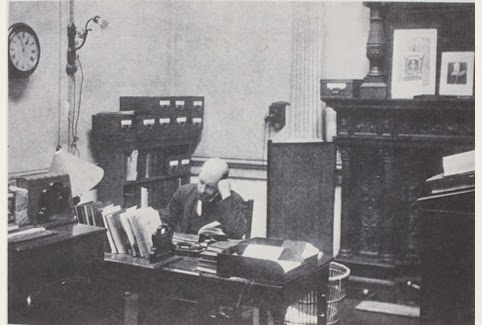We read as far as "... a Penelope stayathome." (Penguin 258.4) (Gabler 9.620)
The topic of discussion is the plays - Pericles, The Winter's Tale, Cymbeline, The Tempest - written by Shakespeare in the closing period. Gifford says that 'Stephen's sources all agree that the 'change in tone' in Shakespeare's late plays reflects a change in his outlook.' (Gifford 9.402-4) Mr. Brandes, a Shakespearean scholar, accepts it (Pericles), Stephen said, as the first play of the closing period. It was the lifting of the shadow. A couple of other Shakespearean scholars mentioned on these pages are Sidney Lee, George Bernard Shaw Frank Harris,...
Then the discussion moves on to the dark lady of the sonnets, one of the three characters of Shakespeare's sonnets, the other two being The Fair Youth and The Rival Poet, and who Mr. W. H. is, who is mentioned in the dedication.
Stephen goes on about how Shakespeare would have suffered as a result of being seduced at the young age of 18 by Ann Hathaway, a woman older than himself. ".. he will never be a victor in his own eyes..." Even having other affairs (assumed dongiovannism) will not save him.
The topic of discussion is the plays - Pericles, The Winter's Tale, Cymbeline, The Tempest - written by Shakespeare in the closing period. Gifford says that 'Stephen's sources all agree that the 'change in tone' in Shakespeare's late plays reflects a change in his outlook.' (Gifford 9.402-4) Mr. Brandes, a Shakespearean scholar, accepts it (Pericles), Stephen said, as the first play of the closing period. It was the lifting of the shadow. A couple of other Shakespearean scholars mentioned on these pages are Sidney Lee, George Bernard Shaw Frank Harris,...
Then the discussion moves on to the dark lady of the sonnets, one of the three characters of Shakespeare's sonnets, the other two being The Fair Youth and The Rival Poet, and who Mr. W. H. is, who is mentioned in the dedication.
 |
| (Source: http://en.wikipedia.org/wiki/Shakespeare%27s_sonnets) |
Eglinton, the quaker librarian, and Mr Best listen to Stephen. Stephen thinks, 'They list. And in the porches of their ears I pour.' The word porches lead to the ghost of the dead king in Hamlet. Hamlet's father was killed when poison (the juice of cursed hebenon) was poured into the porch of his ears while he was asleep in the orchard in the afternoon. Stephen asks how did the ghost of the king know how he was killed unless his creator endowed him with this knowledge.
Stephen is majestically quoting here from many Shakespearean plays to underscore his argument that the dead king in Hamlet is Shakespeare indeed. Just as he is mentioning that the voice of the ghost is heard only in the heart of him who is the substance of his shadow (that is Hamlet), evoking Bible to say, the son consubstantial with the father, the seriousness of the discussion is deflated, like a pierced balloon, by the entrance of Buck Mulligan, saying, 'Amen!'
Buck Mulligan is his usual self, joking when he could/should have been serious. For example, when the librarian mentions that Mr Mulligan has his theory too ... of Shakespeare, Mulligan responds saying 'Shakespeare? I seem to know the name.' Mulligan has in his pocket the telegram that Stephen had sent canceling their appointment of meeting in The Ship. He imitates the voice of the writer, Synge, when he describes how he and Haines waited for one hour and two hours and three hours sitting waiting for pints apiece.
Amidst all such buffoonery (Mulligan playing Shakespearean fool), an attendant opens the door to inform the librarian that a gentleman has come from the Freeman, wanting to see the files of the Kilkenny People for last year. The librarian is off (nay he danced off in a galliard) to assist the gentleman. Mulligan snatches the card the attendant had brought in, wondering who this 'gentleman' could be. He sees that it is Bloom, whom he had seen just before in the museum where the statues of Greek goddesses are displayed. (Bloom was there to find out whether they have no. Penguin 225.8)
John Eglinton decides, with Mr Best's approval, to hear more. They begin to get interested in Mrs S (Mrs Shakespeare) of whom they had till then thought of as a Penelope stayathome bringing up yet another parallel in this chapter between Joyce's Ulysses and Homer's Odysseus.


